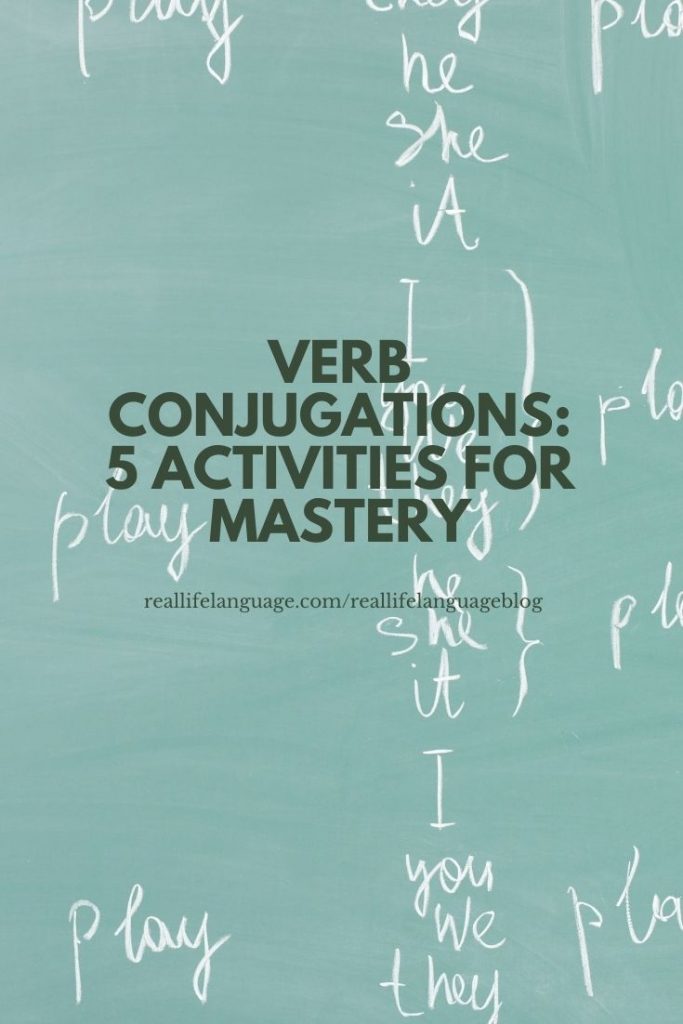Verb Conjugations:
5 Activities for Mastery
Verbs, verbs, verbs. They’re so important, but verb conjugations are often a rough spot.
To really be fluent, you do need to be able to master verbs. You need verbs to express actions, ideas, and who’s doing what. In my opinion, you almost can’t get enough practice. But let’s face it, just working in the textbook all the time is completely boring. You need to have some fun. I wanted to share a few fun activities to help you and your students get some great practice on verbs.
Hot Potato. This was one of the best purchases that I’ve ever made. You can use this in so many ways. Basically, you open up the back, you turn it on, press it, and pass it around until it goes off. The person it lands on must answer a bunch of questions or do something.
Whenever I have a set of verbs we need to do, some new tense or mood- whatever it is- have them get their papers or cheat sheets out. When it lands on a person everybody has to ask them a question (or 5, 10- you get the picture). For example, how do you say ‘I go’, how do you say ‘we went’, whatever verb set that you’re doing, have them do it. It breaks up the monotony and gives them the real practice they need.
Feet. I went to a conference some years ago, and I really wish I could give the person credit who presented this. He talked about feet with verbs. There’s all these cut out paper stock feet with the different subjects on them. They walk through the verb set you are doing, conjugating the verbs as they go over the feet. It’s fun, the class helps them out, and they get some great verb practice.
Checks. Any verb set that we’re doing, not only do they need to know how to conjugate the verb, they need it to make sentences. In Checks, I have them take out a piece of paper and I tell them it’s for extra credit (or whatever it is you do for value in your class). I tell them it’s extra credit so they never think it’s counting against them, but rather all counting for them.
If we do a set of verb conjugations (which they struggle with because they’re beginners), they try to assimilate it. I might say, for example, I eat lunch at 2:00 in English. They’re supposed to write down the Spanish. It’s basically translation. They write down, ‘almuerzo a las dos’ and then I would show them the correct answer, and they would give themselves a check. It’s just fantastic practice. They hand it to you, you look it over and add up their checks. It is pretty old school, but it works.
Asking and answering. It’s the core. I love to give verb asking and answering quizzes and tests.
When you have a set of verbs, they’re going to be linked up to some communicative task, of course. The task might be, for example, talking about places you go. This gives real-life experience of verb conjugations in context.
You might do that in the same chapter that you talk about what you do, where you live and what you play. I know they’re all grouped differently in different books in different languages, but I think you get the point. They’re all going to be themed around a similar communicative idea.
For these ask and answer quizzes and tests, basically everyone has to ask and answer 5 questions. It seems very simple, and it is, but it’s actually very fun and very rewarding. You’re going to be the note taker and making sure everyone asks and answers 5 questions. One student might say, ‘¿Adónde vas mañana?’, ‘Mañana voy a la iglesia’ the other student might say. Where are you going tomorrow? Tomorrow I’m going to church. That student is then going to ask another question to somebody. They can’t use notes, they can’t use their book, and they can’t ask any questions. It’s great because it builds up a communicative conversation using whatever verbs you’ve got and can get beginners talking for long periods of time early on in the game.
Koosh Ball. It’s just a fun little ball that you can throw around. It’s very soft so nobody gets hurt. It’s not too big so it’s never awkward. It’s more than likely not going to knock anything over.
The Koosh Ball is fun to throw around, also getting movement in there. This is going to give you a lot of opportunity to get practice with verbs. How do you say ‘_______’,? And then they pass it to another student. How do you conjugate? Any verb work you want to do you just throw the ball around. It’s really fun and it’s a great change of pace.
What do you do to get your students mastering verbs?
Looking for more resources? https://reallifelanguage.lpages.co/language-lessons-5-weeks-of-low-and-no-prep-fun/
